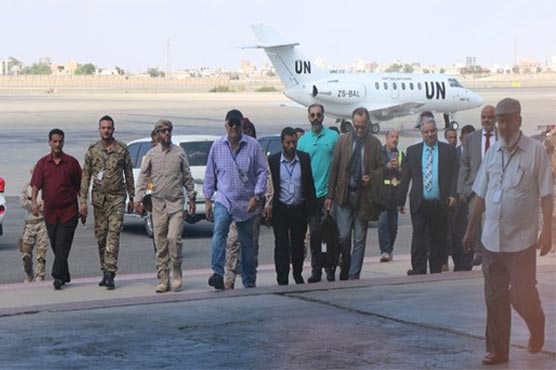UN team arrives in Yemen to monitor Hodeida ceasefire

The team is led by Patrick Cammaert, a retired Dutch general.
ADEN (AFP) - A United Nations team arrived in Yemen on Saturday to monitor a fragile ceasefire in the rebel-held city of Hodeida, the latest push to secure peace in the devastated country.
It comes a day after the UN Security Council unanimously approved a resolution authorising the deployment of observers to Hodeida, a lifeline port city which serves as the entry point for the majority of imports to war-torn Yemen.
The team led by Patrick Cammaert, a retired Dutch general, was seen by an AFP journalist landing in Aden where the internationally-recognised government is based.
Cammaert was welcomed on arrival by Saghir bin Aziz, a general who heads the government team in a joint committee -- with Huthi rebels -- which is tasked with organising the withdrawal of troops from Hodeida.
After meeting with leaders in Aden, Cammaert is due to travel to the rebel-held capital Sanaa and onwards to Hodeida, a Yemeni official said.
Hodeida is held by Yemen’s Huthi rebels and has been subjected to an offensive by pro-government forces, backed by a military coalition led by Saudi Arabia.
A halt to fighting in the strategic port city follows intense diplomatic efforts which culminated in peace talks last week in Sweden, where the warring parties agreed to the truce which came into force on Tuesday.
The Security Council resolution which approved the observer mission also endorsed those prior negotiations.
The UN monitoring team could consist of 30 to 40 people, according to diplomats, and aims to secure the functioning of Hodeida port and supervise the withdrawal of fighters from the city.
Full respect for truce
The text approved by the Security Council "insists on the full respect by all parties of the ceasefire agreed" for Hodeida.
It authorises the United Nations to "establish and deploy, for an initial period of 30 days from the adoption of this resolution, an advance team to begin monitoring" the ceasefire, under Cammaert’s leadership.
The resolution was backed by rebel negotiator Mohammed Abdelsalam, who said late Friday it marked "an important step towards stopping the aggression and lifting the blockade".
He was referring to the Saudi-led military coalition which intervened in 2015 and imposed a blocked on Yemeni waters and airports.
Quoted by the rebel-run Al-Masirah TV, he criticised, however, the resolution for not condemning the "crimes of the aggressors".
The government of President Abedrabbo Mansour Hadi reaffirmed its "commitment (to respect) the agreement" reached in Sweden and endorsed by the UN resolution.
In a statement also released late Friday, the Yemeni government pledged to work "in a positive spirit" with UN envoy Martin Griffiths towards a lasting political agreement to end the war.
Saudi Arabia also welcomed the resolution.
Khalid Manzalawi, the kingdom’s deputy permanent representative to the UN, said the resolutions means that the Huthis "will lose their margin of manoeuvre", the official Saudi Press Agency reported.
Around 10,000 people have been killed since the Saudi-led intervention, according to the World Health Organization, although rights groups say the death toll could be five times higher.
The conflict has unleashed a major humanitarian crisis and pushed 14 million Yemenis to the brink of famine.

